
Bryan Buss (’89)
Stange Award
Dr. Bryan Buss has traveled the world to help improve the public health of underserved and impoverished communities.
This includes helping contain the largest outbreak on record of the Ebola virus in Liberia by deploying there in 2015. Two years later he led a Center for Disease Control and Prevention (CDC) emergency response team in American Samoa, battling the Zika virus.
During the COVID-19 pandemic, he was deployed to the San Francisco International Airport in January 2020 before the virus was detected in the United States, in support of national efforts to stem the virus introduction into the country. He evaluated ill passengers arriving from Wuhan, China, deemed at high risk for infection. Upon returning to Nebraska, Buss aided quarantine activities for repatriated Americans from Wuhan and the Diamond Princess cruise ship.
In Nebraska, he served in several leadership roles in the state’s COVID-19 response. He led the laboratory and community testing workstream to more than triple testing capacity in the state’s first months of response. Buss also represented Nebraska at briefings of the nation’s Operation Warp Speed regarding state readiness in the vaccine roll-out.
Pretty impressive and even more so when you consider, Buss had no real interest in public health during his DVM studies, nor during his time as a mixed animal practitioner in Nebraska.
“When I left Iowa State, I had no plans to work in public health,” Buss said. “I said my oath at graduation along with my classmates, but the two statements at the end (‘promotion of public health’ and ‘the advancement of medical knowledge’) didn’t resonate with me at the time.”
But after 12 years of practice and substantial family events, Buss found himself doing some pretty serious soul searching.
“While I valued my practice experience, I found myself being pulled towards public health issues,” Buss said, “and I found I enjoyed the change of pace.”
During his private practice days, Buss was one of the first Nebraska veterinarians to diagnose West Nile in a horse. He worked with a shelter after individuals were exposed to rabies from a dog.
Then in 2003 he was daily providing up-to-date information on the Mad Cow scare that hit producers around the holidays.
All of which made Buss question his professional future.
“I was really feeling a strong sense of service to the nation and having a broader impact beyond just my local community,” he said.
And what an impact Buss has had since he made the career switch and was commissioned as an officer in the U.S. Public Health Service. He has served as a CDC Epidemiology Field Officer assigned to Nebraska for the past 15 years.
Buss and his team have been instrumental in increasing Nebraska’s public health epidemiology and workforce capacity, building model electronic disease surveillance systems, managing statewide public health responses, and enhancing the public health infrastructure.
It’s exactly what he was looking for when he made the switch to public health.
“I like the opportunities to have positive impact on human population health and to be involved in disease outbreak responses, whether global, national or local,” Buss said. “I feel like I’m contributing to the ‘greater good.’”
June 2024
